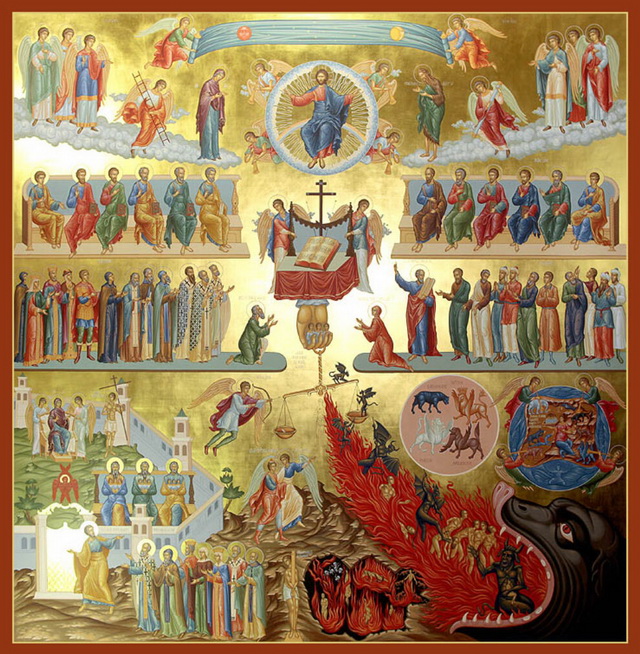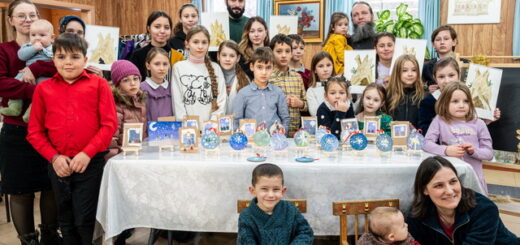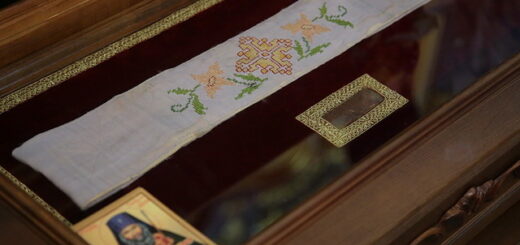Parable of the Last Judgment

Parable of the Last Judgment, last preparatory week before Great Lent.
For the last time before Great Lent, Christ reminds us that without love for one another, love for God is impossible. With the story of the Last Judgment, the Gospel summarizes the epistle of St. John says that “if anyone says, ‘I love God,’ and hates his brother, he is a liar. For he who does not love his brother whom he sees cannot love God whom he does not see” (1 Jn. 4:20).
The Lord places love of God and neighbor above all other commandments and virtues[1], calling us, following the example of the Good Samaritan, to see a neighbor in every person, regardless of their skin color, their religion, nationality, political beliefs, etc. (Luke 10:25-37).
The story of the Last Judgment is not even a parable, because a “parable” – is an allegorical story. Here, everything is said directly. In this text, there are no comparisons (except to compare the righteous with sheep, and sinners with goats), nor paraphrases.
“For I was hungry, and you gave me something to eat; I was thirsty, and you gave me something to drink; I was a stranger, and you welcomed me; naked, and you clothed me; sick; and you visited me; I was in prison, and you came to me” (Mt. 25:35-36).
Speaking of the Last Judgment, the Lord enters into direct controversy with the Pharisees, quoting the prophet Isaiah almost word for word[2]. This is also why the Church offers us this evangelical reading before Great Lent, since the prophet Isaiah links fasting (of which the Pharisees were so proud!) to concern for our neighbor.
From other passages of the Holy Scriptures, we can conclude that the meaning of Great Lent is not at all about what we eat or do not eat[3], but about how much we love one another. It is in this context (even if he speaks of offerings to idols) that the apostle Paul says: “Yet it is not food that can make us acceptable to God: if we eat it, we do not eat it. Let’s gain nothing; if we don’t eat it, we don’t lose anything either. But be careful that the freedom you take does not become an occasion for the weak to fall. When you sin in this way against the brethren by wounding their weak conscience, you sin against Christ. Therefore, if any food causes my brother to stumble, I will abstain from meat forever, that I may not cause my brother to stumble” (1 Cor. 8:8-9, 12-13). .
The Lord tells us that already here on Earth, we ourselves determine our place in the afterlife, and that the Last Judgment is only a statement of the choice we have made. At the Second Coming, Christ will appear in His glory to judge all humanity. This judgment is also called “terrible” because it is the very last: after it, there is only eternal happiness or eternal suffering. However, we should not imagine – by the word “judgment” – that God rejoices in the punishment of sinners. Concerning their fate, the Lord said with regret: “Depart from Me, you cursed. Go into the everlasting fire of the devil and his angels” (Mt. 25:41). Why with “regret”? Because, as we see in His words, this fire was not prepared for people at all.
Many parallel passages speak of the same fate for the righteous and sinners. In the parable of the rich man and Lazarus, Abraham responds to the rich man, who during his lifetime did not even notice the beggar Lazarus: “Remember that you had your goods during your life, and Lazarus, his ailments; now he is here comforted, and you are suffering.” Abraham also said about the brothers of the rich man who remained on earth and lived in injustice: “They have Moses and the prophets: let them listen to them! » (Lk. 16:25, 29).
“The oppressor of the poor insults his Creator, but it honors Him to have pity on the needy” (Prov. 14:31).
“He, who receives you, receives Me. He who receives Me, receives Him who sent Me. … whoever gives one of these little ones a cup of cold water, because he is My disciple, truly I tell you, he will not lose his reward” (Mt. 10:40, 42). ).
We can start thinking like this: “I won’t help my neighbor because there won’t be enough for me or my family.” The Lord responds to such reflections: “Whoever tries to save his life will lose it; whoever loses it for My sake will find it” (Mt. 10:39).
Furthermore, the story of the Last Judgment speaks to our imagined understanding of serving God. It seems to us that we please God by reading countless numbers of akathists every day, but at the same time we do not notice people who need us.
Saint Philaret (Drozdov) thus comments on the fate of the righteous and sinners: “Then the savage, recently converted to Christ, will take his place among the elect, and he who is born into Christianity will remain among the excluded; a simple man will fly to Heaven, and the unworthy altar server will be covered with shame and disgrace.”
God is impartial; he does not look at the priesthood, the fact that a person attended church all his life. Likewise, God does not look at the sins committed by man – the story of the Last Judgment does not at all speak of man’s sins as an obstacle to his entry into the Kingdom of Heaven. The Lord looks at our humbled heart and the degree of its repentance:
“Wash yourselves, purify yourselves, cease doing evil, learn to do good, respect the law, protect the oppressed, do justice to the orphan, defend the widow. Having done this, come, let us explain, says the Lord. Even though your sins are scarlet, they will be white as snow” (Is. 1:16-18).
[1] “Master, what is the greatest commandment in the Law? » Jesus answered: “You shall love the Lord your God with all your heart, and with all your soul, and with all your mind. This is the great, the first commandment. And this is the second, which is like it: You shall love your neighbor as yourself” (Mt. 22: 36-39).
[2] “On the day that you fast, you transact your affairs, and you constrain all your workers. You spend your fast in arguments and quarrels, you hit the poor with your fist. It is not by fasting like this that you will get your voice up there. Is this a fast that pleases me, a day when man mortifies himself? Bowing your head like a rush, lying in sackcloth and ashes: can you call this a fast, a day pleasing to the Lord? Do you know what fast I accept? Says the Lord God: to break unjust chains, to untie the cords of the yoke, to set free the oppressed, and to bridle every kind of yoke. It is to share your food with the hungry, to shelter the unfortunate without shelter, to clothe the ragged people instead of turning away from your fellow man” (Is. 58: 3-7).
[3] “The kingdom of God is not eating or drinking, but righteousness and peace and joy in the Holy Spirit” (Rom. 14:17).




